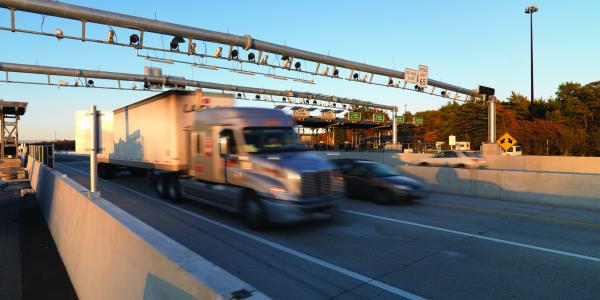Tolling Points
Truckers’ Woes Make the Case for States’ Flexibility

With recent comments that identified the trucking industry as one of the chief beneficiaries of a well-financed highway system, U.S. Rep. Earl Blumenauer (D-OR) opened one of the most powerful arguments for giving states greater flexibility to fund needed roadway improvements as they see fit.
"The trucking industry probably is suffering more than any other sector of our economy from our failure to adequately fund infrastructure,” said Blumenauer, author of two House bills to raise the gas tax from 18.4 to 33.4 cents and introduce a road usage fee pilot program based on experience in his home state.
“They pay the penalty for lack of maintenance, for congestion and, frankly, for political gridlock and fighting,” he told Truckinginfo, an online publication for owner-operators, in January.
Truckers Already Pay the Price
Blumenauer wasn’t talking about a theoretical cost that truckers will incur in the future. In states like Pennsylvania, they’re already paying the price. That’s where freight operators learned late last August that the Department of Transportation (PennDOT) had placed tough new weight restrictions on about 1,000 bridges across the state.
According to the Pittsburgh Tribune Review, the restrictions were “the first tangible byproduct” of an inability to allocate $1.5 to $2 billion for infrastructure repairs from the state’s general fund budget. “Without that funding, PennDOT is regulating traffic to slow the wear and tear on bridges it deems structurally deficient.”
One state senator predicted that truckers would be forced to drive extra miles through detours, leading to higher shipping costs for private enterprise. That concern was amplified in mid-September, when the National Association of Manufacturers and the Building America’s Future Foundation published a survey of U.S. manufacturers’ views on infrastructure:
- 70% say America’s roads are getting worse.
- 65% believe infrastructure, especially in their region, is insufficient to meet the competitive demands of a growing economy.
- 67% believe infrastructure funding is important enough that all options should be on the table.
- 61% would pay higher taxes, tolls, or fees to get the infrastructure they need, “if they have the assurance that revenues go toward specific improvements.”
Without Trucks, America Stops
The American Trucking Association (ATA) has it right when they talk about the economic importance of safe, efficient highways.
“The trucking industry is the lifeblood of the U.S. economy,” states the ATA website. “Nearly 70% of all the freight tonnage moved in the U.S. goes on trucks. Without the industry and our truck drivers, the economy would come to a standstill….without trucks, America stops.”
But as Pennsylvania has learned, that lifeblood slows down when it depends on a transportation funding system that is out-of-date and quite frankly, underfunded.
That’s why Blumenauer’s statement last month was so important and timely. “In the long run, the trucking industry will be the greatest beneficiary of a system that’s adequately financed and has instant data to better manage it,” he said. “That’s going to translate to their bottom line, and it’s going to solve some of their practical, logistical, and political problems.”
Common Ground on Interoperability
ATA’s members certainly understand what delays and administrative costs can do their bottom line. That may be why the association seemed so pleased last summer when the Alliance for Toll Interoperability announced its new central collection hub, an important step on the road to full interoperability across U.S. toll roads.
“Carriers and Congress have said they want interoperable toll systems that will allow truckers to travel through various tolling jurisdictions without buying multiple electronic transponders or having to stop to pay tolls in cash, which costs more and wastes time,” according to the ATA’s Transport Topics newsletter.
With the adoption of the 2012 transportation reauthorization bill, MAP-21, Members of Congress didn’t mandate a solution to that problem. But they legislated the demand, and IBTTA members know full well that the tolling industry has embraced the 2016 deadline for full interoperability across the United States. Tolling agencies are working hard to make interoperability a reality—for truckers, and for the millions of daily commuters who rely on the reliability of toll roads.
With the flexibility to choose from a toolbox of funding options, including tolling, state and local government will be in a position to modernize their highway systems and clear local transportation bottlenecks, as part of a combined effort to move America forward.




0 Comments